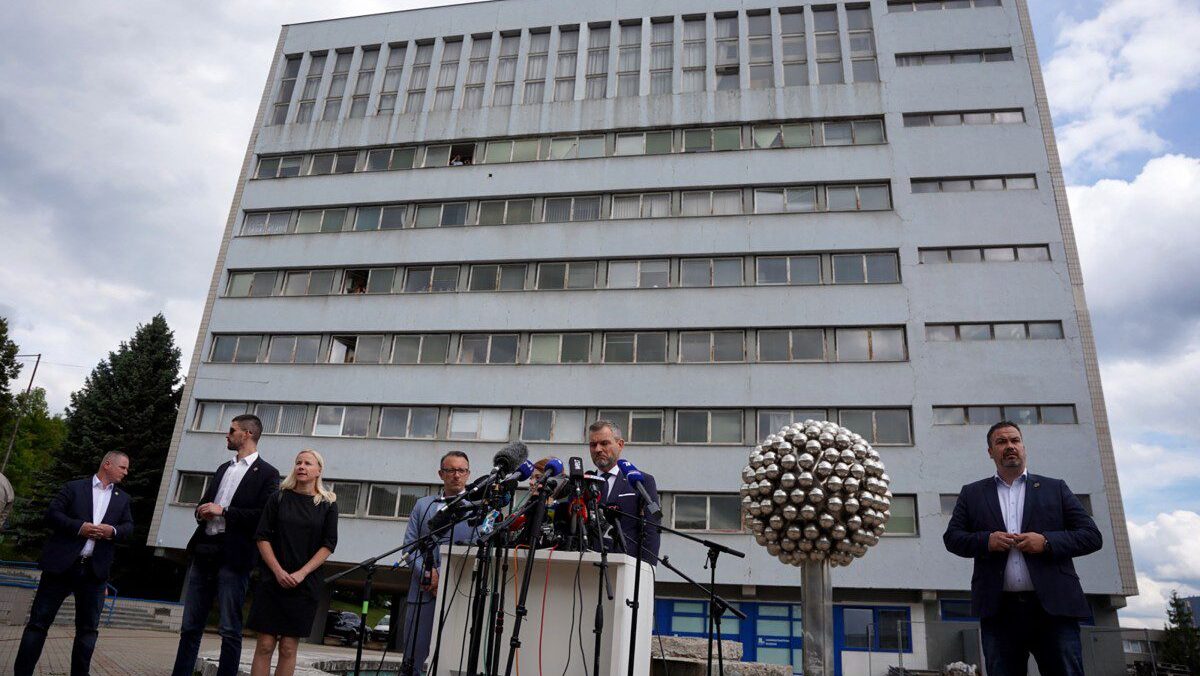
Slovakia’s president-elect Peter Pellegrini (2nd R) addresses journalists on May 16, 2024 in front of the hospital in Banska Bystrica, Slovakia, where Slovak Prime Minister Robert Fico is being treated after he was shot “multiple times” the day before.
Photo: AFP
Slovakian Prime Minister Robert Fico is still in serious condition following an assassination attempt against him on Wednesday, May 15th, and doctors will assess on Monday whether he can be transported from the hospital in Banska Bystrica to the capital Bratislava. According to President-elect Peter Pellegrini, who visited Fico in hospital on Thursday, the prime minister is in serious but stable condition. “He is able to speak but only a few sentences and then he is really tired because he is on some medication,” he added. Fico remembers the events of Wednesday and was conscious during the transport to the hospital.
Answer to a journalist's question about how my conversation with the Prime Minister went today 👇 pic.twitter.com/dv3iPs79ck
— Peter Pellegrini (@PellegriniP_) May 16, 2024
The populist prime minister was shot multiple times from at point-blank range by 71-year-old Juraj Cintula in the central Slovakian town of Handlová after a government meeting. As we reported, Cintula is a poet and writer, and former security guard at a shopping mall, who had no previous brushes with the law, but had taken part in previous anti-Fico demonstrations. In a video uploaded on social media, Cintula is seen after his arrest saying he does not agree with the policies of the government. Ironically, in 2016, he attempted to start a movement “Against Violence.”
According to Slovakian media reports, the perpetrator told police he had been preparing the attack for a few days. He intended to hurt the prime minister, but he said he did not want to kill him. Police have warned the public against spreading disinformation with regards to the attacker. Authorities say that rumours on social media stating that Cintula is a member of the opposition liberal Progressive Slovakia party, that he was a member of a pro-Russian paramilitary Slovak group, or that his wife is a Ukrainian refugee, who incited her husband to take revenge on Fico because he stopped supplying weapons to Ukraine, are all false.
The motive for the attack was dissatisfaction with the current government, Interior Minister Matúš Šutaj Eštok said on Thursday. “This was a politically motivated act,” he added. “The suspect is not a member of any radicalised political group—neither right-wing nor left-wing. He’s a lone wolf.” Šutaj Eštok blamed the media for distorting facts and presenting an image of the government that is false. He mentioned among other things the reports about the abolition of the special prosecutor’s office, which has caused a tense political debate both in Slovakia as well as in EU institutions. The current sovereigntist government of Robert Fico claims the office, which deals with political corruption cases, was politically misused by the previous, EU-aligned, centre-right-liberal cabinet to only investigate and prosecute members of Fico’s party.
President-elect Peter Pellegrini—Fico’s ally—and outgoing President Zuzana Čaputová—a political opponent of Fico—held a joint press conference on Thursday, calling for calm. Čaputová urged Slovakia to “step out of the vicious circle of hatred,” saying “while the assassination attempt was an individual act, “the tense atmosphere of hatred has been our collective work.” Pellegrini asked political parties to suspend their campaign ahead of the EU elections in June to prevent further confrontation. The two invited the leaders of all parliamentary parties to the presidential office next Tuesday in an effort to calm the situation.
According to opinion polls published before the attack on Fico, two out of the three governing parties—Fico’s Smer and Hlas—are expected to gain seven seats in the European elections, from the fifteen allocated to Slovakia. Progressive Slovakia is projected to get five, right-wing Eurosceptic Republika two, and liberal Freedom and Solidarity one. Both Smer and Hlas said they would tone down their respective election campaigns in a bid to decrease societal tensions.
Fico won parliamentary elections last September on an EU-critical, anti-immigration and anti-war platform. He has refused to send weapons to Ukraine and has called for peace talks to begin to end the war with Russia. His ally, Peter Pellegrini won the presidential election in April, defeating Europhile candidate Ivan Korčok.
“We are facing an election that will decide not just about members of European Parliament but along with the U.S. election can determine the course of war and peace in Europe,” Fico’s only European anti-war ally, Hungarian PM Viktor Orbán said on Friday in an interview with public radio station Kossuth Rádió. “In that situation we would have badly needed Robert Fico and a pro-peace Slovakia,” he added.
🗳️ @PM_ViktorOrban: The upcoming election decides war and peace in Europe
— Zoltan Kovacs (@zoltanspox) May 17, 2024
🎙️ In his Friday morning interview on "Good Morning, Hungary," Prime Minister Viktor Orbán discussed the significant political and economic issues facing Hungary and Europe. He began by reflecting on the… pic.twitter.com/j3hecTwwOP
